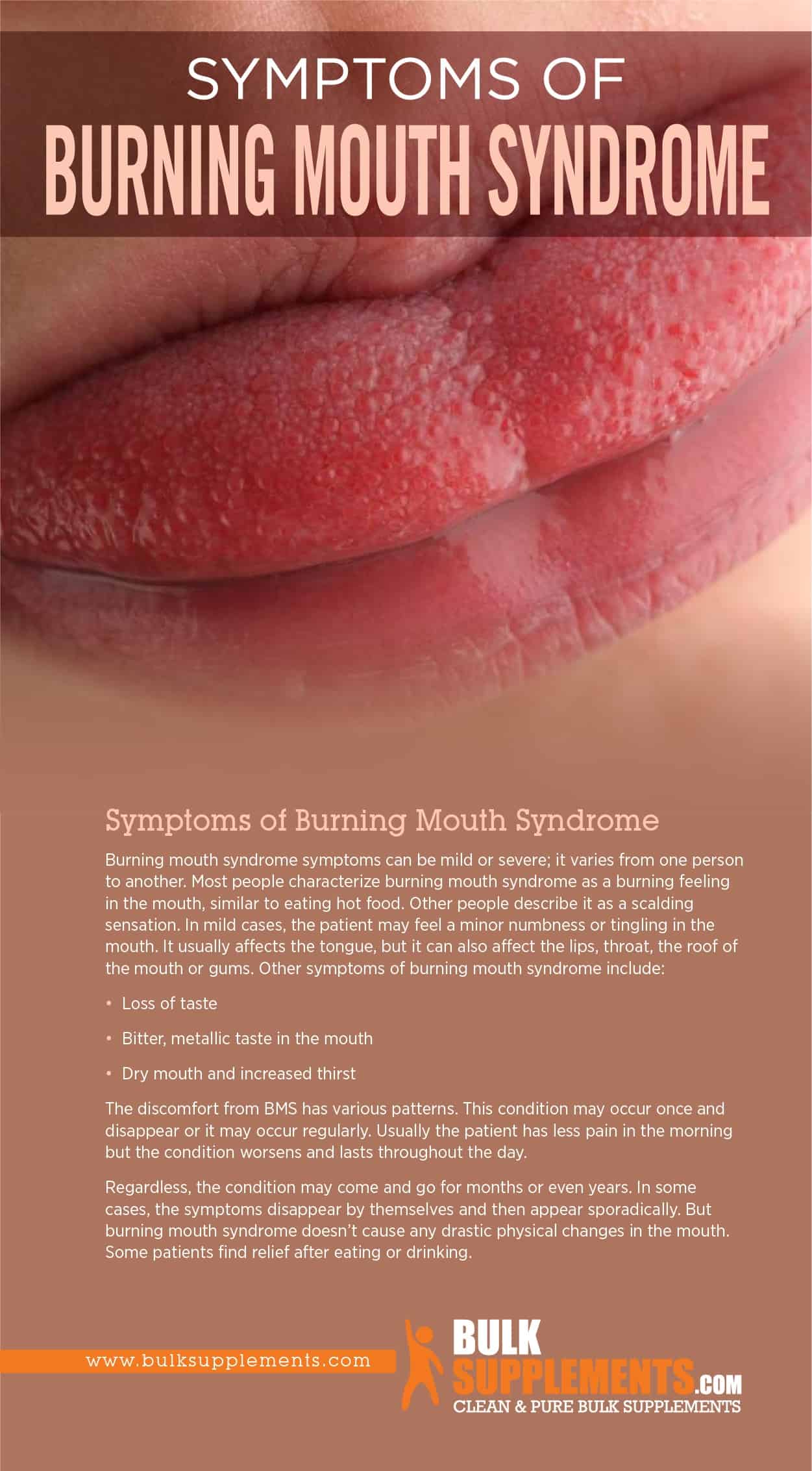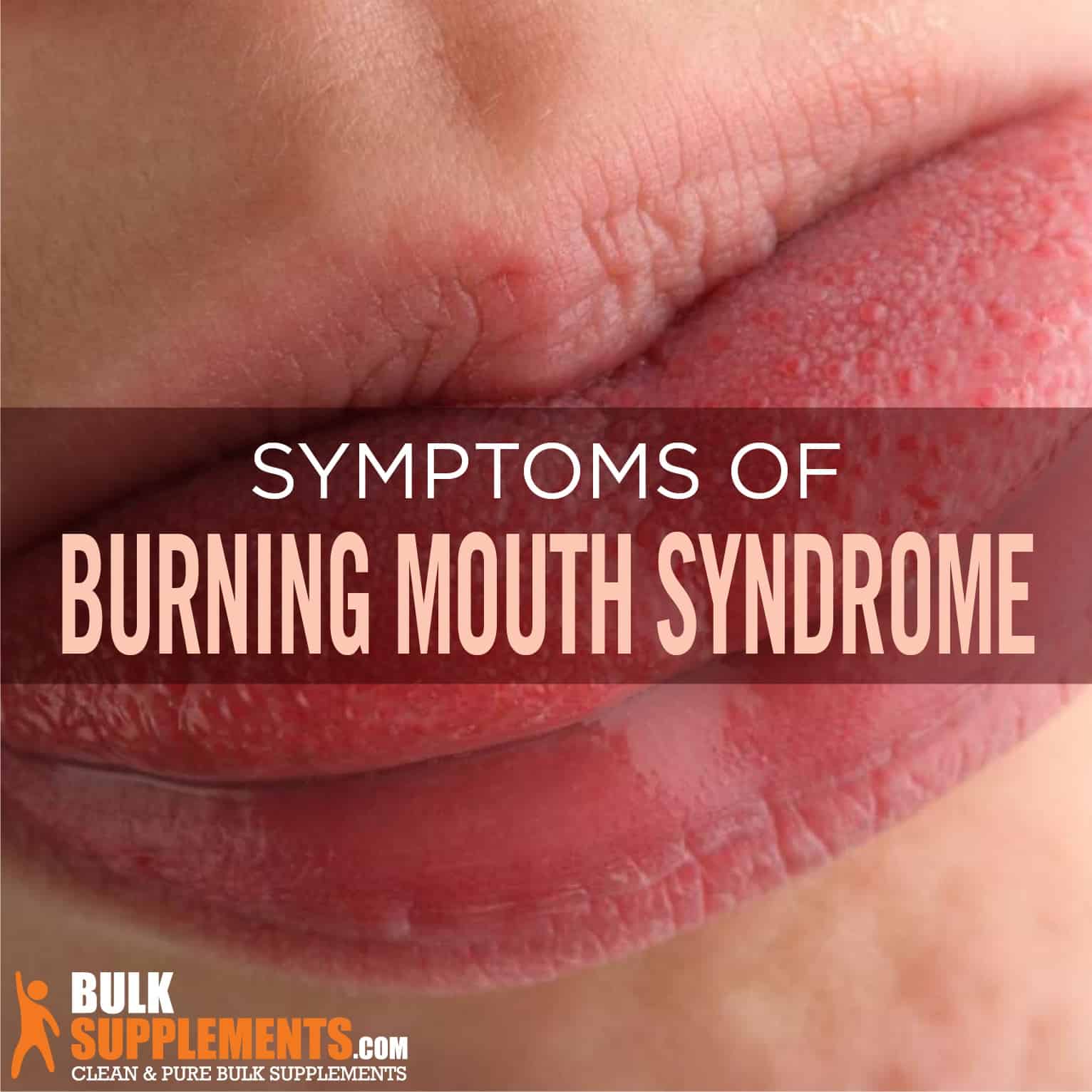What is Burning Mouth Syndrome?
Burning mouth syndrome (BMS), or burning tongue, is a disorder that causes a burning feeling in the mouth. Patients with this disorder often feel like a hot drink is scalding their mouths. Doctors have identified various risk factors and potential causes of BMS, but the specific reasons are often unclear. Treatment for this condition depends on the exact cause (x).
The American Academy of Oral Medicine reports that about 2 percent of people in the United States have burning mouth syndrome (x). It may affect different areas of the mouth, including the tongue, the roof of the mouth, gums, lips and the inside of the cheeks. Burning mouth syndrome may occur occasionally or it can become a daily issue. It may also become chronic. Specifically, women are up to seven times more likely to have the condition than men (x).
Symptoms of Burning Mouth Syndrome
Burning mouth syndrome symptoms can be mild or severe; it varies from one person to another. Most people characterize burning mouth syndrome as a burning feeling in the mouth, similar to eating hot food. Other people describe it as a scalding sensation. In mild cases, the patient may feel a minor numbness or tingling in the mouth. It usually affects the tongue, but it can also affect the lips, throat, the roof of the mouth or gums. Other symptoms of burning mouth syndrome include (x, x):
- Loss of taste
- Bitter, metallic taste in the mouth
- Dry mouth and increased thirst
The discomfort from BMS has various patterns. This condition may occur once and disappear or it may occur regularly. Usually the patient has less pain in the morning but the condition worsens and lasts throughout the day (x).
Regardless, the condition may come and go for months or even years. In some cases, the symptoms disappear by themselves and then appear sporadically. But burning mouth syndrome doesn’t cause any drastic physical changes in the mouth. Some patients find relief after eating or drinking (x, x).

Causes of Burning Mouth Syndrome
Doctors do not know exactly what causes burning mouth syndrome. A burning mouth is often caused by more than one factor. Despite careful examination, sometimes doctors are unable to pinpoint the exact cause of BMS symptoms. It is important to identify the cause(s) of the condition so that a doctor can tailor a treatment.
BMS may be primary or secondary. Primary BMS is a result of damage to the nerves that regulate pain and taste. Secondary BMS accompanies another medical condition (x).
Dry Mouth (Xerostomia)
This condition is associated with some medications, including diuretics, high blood pressure medication, antidepressants and antihistamines (x). It may also occur with Sjogren’s syndrome (x).
Oral Disorders
Oral thrush is a fungal infection from a group of yeasts, candida. One symptom of oral thrush is a burning sensation in the mouth (x). Another oral disorder that may cause burning mouth syndrome is geographic tongue, an inflammatory disorder on the top and sides of the tongue. Patients with geographic tongue have red lesions on the tongue with a white border around them. Aside from the patches, it can also cause discomfort or burning on the tongue and in the mouth (x, x).
Nerve Damage (Neuropathy)
Damage to the nerves that control pain and taste can cause sporadic burning sensations in the mouth. This is associated with primary burning mouth syndrome (x).
Allergies
Burning mouth syndrome may be a reaction or allergy to foods, dental products or metal dental tools (x).
Gastroesophageal Reflux Disease (GERD)
GERD causes stomach contents to rise up the upper gastrointestinal tract so that it ends up in the throat. It may cause pain or irritation in the mouth and throat (x).
Risk Factors for Burning Mouth Syndrome
Hormonal Imbalances
Burning mouth syndrome mostly affects postmenopausal women. Fluctuating hormone levels can affect the makeup of saliva. Women who have transitioned through menopause have a higher risk of BMS. It’s estimated that between 18 and 33 percent of postmenopausal women have burning mouth syndrome (x, x).
Hypothyroidism is also associated with hormonal changes. Studies show that underactive thyroids may cause burning mouth syndrome in some cases. Hypothyroidism may impact tactile sensations, causing pain or discomfort on the tongue (x).
Age
Studies show that burning mouth syndrome occurs more often in middle-aged patients than younger patients. Specifically, it affects middle-aged women because of hormonal changes associated with age and menopause (x). Older patients are also more likely to wear dentures, which can irritate the condition.
Medications
ACE inhibitors help regulate blood pressure and kidney damage from diabetes (x). Although they are effective, studies state that these medications may trigger burning mouth syndrome if the patient has high kallikrein in their saliva, which increases inflammation in the mouth (x).
Nutritional Deficiencies
A lack of nutrients can impact oral tissues and cause a burning sensation in the mouth. For example, patients who do not consume enough zinc, iron, folate (Vitamin B9), riboflavin (Vitamin B2), thiamine (Vitamin B1), cobalamin (Vitamin B12) and pyridoxine (Vitamin B6) may suffer from burning mouth syndrome (x).
Emotional Factors
Research links emotional disorders to BMS, such as anxiety and depression. Also, patients who have an extreme fear of cancer may also have the condition. These psychological and emotional conditions may cause physical symptoms such as a burning mouth. However, patients who already have burning mouth syndrome may also develop anxiety, depression or a fear of cancer as a result of BMS (x).
Treatment for Burning Mouth Syndrome
Burning mouth syndrome typically doesn’t cause complications, but patients with the condition may experience anxiety or depression. They may also experience disrupted sleep and may have trouble eating or swallowing (x). Burning mouth syndrome has no specific cure. The best thing to do is to treat the symptoms. Treatment depends on the underlying cause, the symptoms and their severity. Possible treatments include:
- Products to make saliva and improve dry mouth
- Ointments to relieve pain
- Vitamin supplements (including Vitamin B1, iron or zinc) to provide nutrients
- Medication for anxiety or depression or to improve sleep
Home Remedies for Burning Mouth Syndrome
Patients may find relief from burning mouth syndrome with home remedies.
Ice and Fluids
The pain often improves when drinking or eating. To ease symptoms, drink lots of fluids throughout the day or suck on ice cubes. Doing so will also relieve the feeling of a dry mouth and can temporarily mask bad tastes in the mouth.
Avoid Problem Drinks and Foods
Harsh or strong-tasting drinks and foods can irritate the mouth. Avoiding or limiting the consumption of these foods can be helpful (x, x):
- Spicy foods
- Alcohol
- Acidic drinks, such as citrus juices, coffee and soda
- Acidic foods, including citrus fruits and tomatoes
Dental Hygiene Habits and Products
Oral health products, such as mouthwashes and toothpaste, can inflame the lining of the mouth. Try not to overuse mouthwash and other abrasive products. For example, flavorless toothpaste may be more effective for sensitive teeth and mouths. Grinding the teeth and biting the tip of the tongue can also cause a burning mouth (x).
Reduce Stress
Anxiety, stress and depression can cause burning mouth symptoms or make them worse. In turn, burning mouth syndrome can increase stress levels because it affects the overall quality of life. Patients should try to decrease their stress levels and seek treatment for other emotional disorders. Exercise can help reduce stress naturally.
Supplements for Burning Mouth Syndrome
Patients considering taking supplements to help relieve a burning mouth should consult a physician before beginning a regimen. However, they are not a treatment for medical conditions and it is always best to follow a physician’s instructions. Here are some common natural supplements that may help reduce BMS symptoms.
Alpha Lipoic Acid Powder (ALA)
One study found that taking 600 mg of alpha lipoic acid daily can improve symptoms of burning mouth syndrome. Researchers have not concluded how exactly ALA helps ease BMS symptoms. However, research shows its potential to fight diabetes, maintain eye health, prevent sun damage on skin, prevent memory loss and act as a strong antioxidant (x).
The recommended dosage for alpha lipoic acid powder is 600 mg once or twice a day with food. Follow a doctor’s dosage instructions. Taking too much can cause unbalanced ALA levels in the body.
St. John’s Wort
This herb may improve mood and promote mental health. St. John’s wort may also help treat depression. Take 600 mg of St. John’s wort extract one to three times per day, or as suggested by a doctor. Speak to a doctor first before using this supplement.
Zinc
Doctors associate zinc deficiency with a burning mouth (x). It is estimated that almost 2 billion people in the world have a slight zinc deficiency (x). The main signs of zinc deficiency include weakened immune system function, poor neurological function, allergies, diarrhea, leaky gut, thinning hair, rashes or acne. As a dietary supplement, take one to three 100 mg doses of zinc orotate powder, or follow a physician’s orders.
Vitamin B12
One of the possible underlying causes of BMS is a lack of Vitamin B12. In one study, researchers concluded that Vitamin B12 decreases abnormally high amounts of homocysteine present in patients with burning mouth syndrome. Forty-four percent of participants in the study experienced full remission of all BMS symptoms after treatment (x). The recommended dosage for Vitamin B12 powder is 100 to 200 mg daily, unless a doctor recommends a different dosage.
The Bottom Line
Burning mouth syndrome triggers a sudden scalding, burning feeling in the mouth. It can occur in any part of the mouth, like the throat, tongue, the insides of the cheeks, gums and roof of the mouth. Some people experience burning mouth syndrome every day for long spells, while others only experience it sporadically.
Patients report a burning, tingling or scalding sensation in the mouth. These symptoms have varying levels of severity in different patients. The pain may last for hours to days. It can also begin suddenly, go away and then reappear several months later. Other symptoms can include a dry mouth, numbness and a metallic, bitter taste in the mouth.
Burning mouth syndrome is either primary or secondary. Primary BMS has no identifiable cause, while secondary BMS is associated with an underlying condition. Some possible underlying health issues that may cause burning mouth syndrome include a dry mouth, allergies, GERD, hormonal imbalances, certain medications and oral infections.
Burning mouth syndrome has no cure, but treatment usually aims to manage the symptoms and relieve discomfort. Treatment can include medications or nutritional supplements. To manage the symptoms of burning mouth syndrome, patients can try cognitive behavioral therapy, pain-relieving medications, oral rinses, specific anticonvulsants, antidepressants or sedatives or saliva-replacement products. BMS may also be a result of nutritional deficiencies. Thankfully, supplements can help the body get the nutrition it needs.


